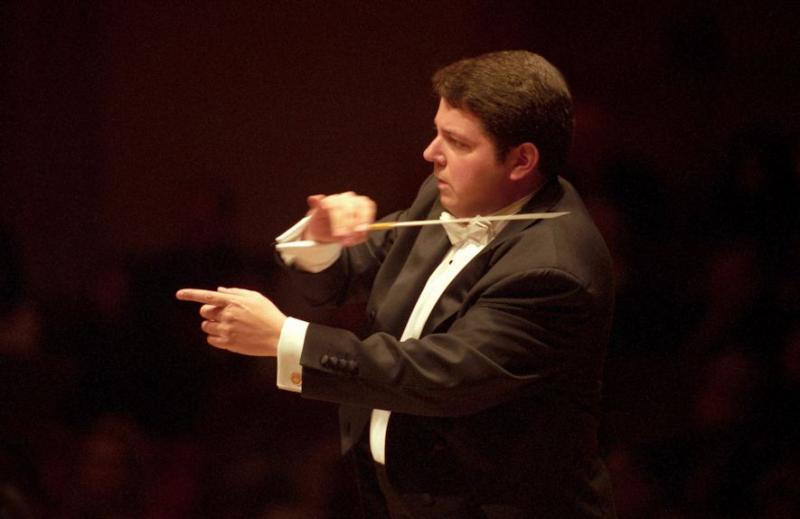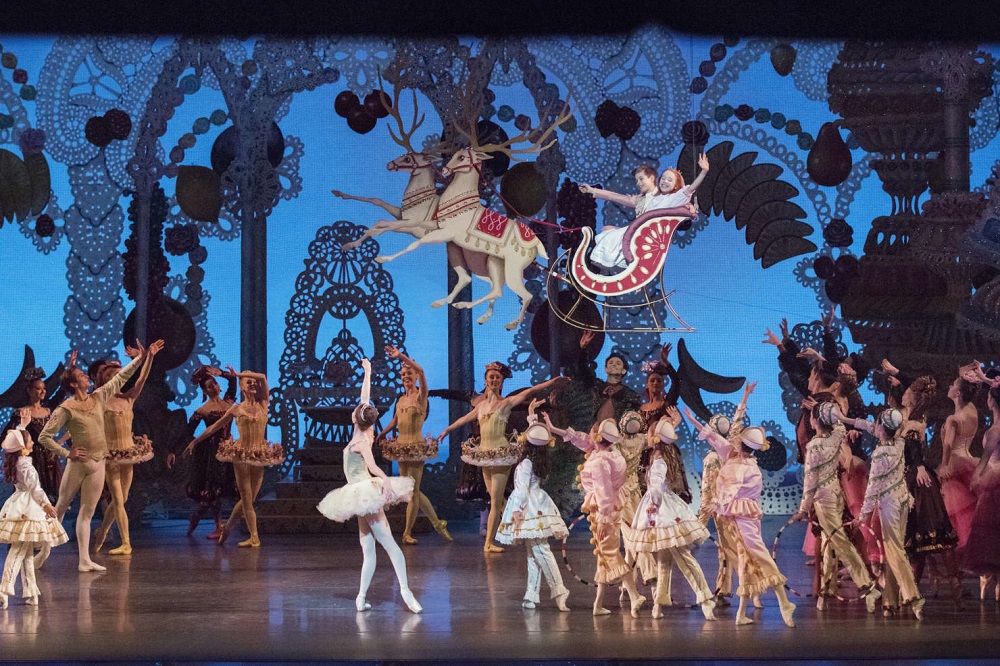Bournemouth SO, Litton, Lighthouse, Poole review - a Coup de Ballet sans dancers | reviews, news & interviews
Bournemouth SO, Litton, Lighthouse, Poole review - a Coup de Ballet sans dancers
Bournemouth SO, Litton, Lighthouse, Poole review - a Coup de Ballet sans dancers
Brilliant team of long acquaintance steps out to Debussy, Bizet and Tchaikovsky

Welcome back Andrew Litton, Conductor Laureate of the Bournemouth Symphony, for the latest of many happy annual returns since his tenure as Principal Conductor between 1988 and 1994.
Lighthouse was thronged with devoted supporters for both the performance and pre-concert talk in which the conductor highlighted the balletic thread of a programme inspired by his ongoing work as Music Director of the New York City Ballet and works choreographed and performed there by the legendary George Balanchine.
Litton had amusingly signed off his talk saying how much he was looking forward to performing the works in concert without having to worry about dancers’ tempo preferences. Amply demonstrated throughout every bar of Debussy’s Prélude à l’après-midi d’un faune, Bizet’s Symphony in C and the complete second act of Tchaikovsky’s The Nutcracker, the release from strict balletic constraints was clearly audible – appropriate enough for the Debussy and Bizet, which were conceived as purely orchestral works, but potentially less so with Nutcracker. With sleight of baton and gesture however, the conductor channelled his consummate ballet experience to energise and complement each work with its own natural flexibility and freedom of movement, while cannily holding true to the broader general parameters of dance.
This allowed the diaphanous textures of the Faune to waft heat, light and languor with a captivating and purposeful sensitivity that remained tantalisingly suggestive of thought rather than action to reflect the Mallarmé poem that inspired the composer. The 17-year-old Bizet’s dazzlingly inventive symphony comes as brimful of hyperactive dance rhythms as Beethoven Seven, with the contrasting second movement sporting one of the composer’s most sinuously beautiful oboe melodies, readily foreshadowing steps towards Carmen. The whole work is a choreographic gift, its high spirits affectionately articulated by the conductor without pushing fast tempi to the extremes that can compromise coherence of the piece – and especially the bowing arms of the strings in the finale. Bravo Bournemouth!  How wonderful to hear a complete act of a Tchaikovsky ballet in concert. The superb quality of Act Two of The Nutcracker completely vindicated Litton’s declared stance on the programme (pictured above, the final scene from the New York City Ballet's seasonal classic George Balanchine's The Nutcracker). No-one asked at the talk how many times he’s conducted the complete work, but his comprehensive expertise on the clockwork of this masterpiece was conveyed to the orchestra with thrilling conviction and spontaneity. The irrepressible invention and eloquence of the characteristic dances more often heard as a separate suite led to a cumulatively paced Pas de Deux that nailed the epic climax of the whole work with overwhelming power and intensity. Is there any other music that offers so much from the development of a thematic and rhythmic ear-worm based on the repetition of a descending scale? The Christmassy tinsel of the harps and celesta framed the proceedings with their own special celebratory glitter.
How wonderful to hear a complete act of a Tchaikovsky ballet in concert. The superb quality of Act Two of The Nutcracker completely vindicated Litton’s declared stance on the programme (pictured above, the final scene from the New York City Ballet's seasonal classic George Balanchine's The Nutcracker). No-one asked at the talk how many times he’s conducted the complete work, but his comprehensive expertise on the clockwork of this masterpiece was conveyed to the orchestra with thrilling conviction and spontaneity. The irrepressible invention and eloquence of the characteristic dances more often heard as a separate suite led to a cumulatively paced Pas de Deux that nailed the epic climax of the whole work with overwhelming power and intensity. Is there any other music that offers so much from the development of a thematic and rhythmic ear-worm based on the repetition of a descending scale? The Christmassy tinsel of the harps and celesta framed the proceedings with their own special celebratory glitter.
On this form the Bournemouth orchestra continues to shine with both the CBSO and Hallé as a National Musical Treasure to complement those in London and the UK regional capitals. Special mention has to be made of Anna Payne’s exquisite flute solo that raised the curtain on Debussy’s Faune to initiate the sustained magic of the evening. The sharing of the Bizet oboe melody between Edward Kay and Rebecca Kozam was a hypnotic hook with an eye to a habañera, but the solo prize has to go to principal harpist Eluned Pierce. A minimal raised eyebrow cue from the conductor signalled the most articulate and spellbinding introduction to The Waltz of the Flowers that I’ve heard in many a long year, live or recorded this side of Paradise. Truly a thing of wonder! Keep dancing…
rating
Explore topics
Share this article
The future of Arts Journalism
You can stop theartsdesk.com closing!
We urgently need financing to survive. Our fundraising drive has thus far raised £49,000 but we need to reach £100,000 or we will be forced to close. Please contribute here: https://gofund.me/c3f6033d
And if you can forward this information to anyone who might assist, we’d be grateful.

Subscribe to theartsdesk.com
Thank you for continuing to read our work on theartsdesk.com. For unlimited access to every article in its entirety, including our archive of more than 15,000 pieces, we're asking for £5 per month or £40 per year. We feel it's a very good deal, and hope you do too.
To take a subscription now simply click here.
And if you're looking for that extra gift for a friend or family member, why not treat them to a theartsdesk.com gift subscription?
more Classical music
 Anja Mittermüller, Richard Fu, Wigmore Hall review - a glorious hall debut
The Austrian mezzo shines - at the age of 22
Anja Mittermüller, Richard Fu, Wigmore Hall review - a glorious hall debut
The Austrian mezzo shines - at the age of 22
 First Person: clarinettist Oliver Pashley on the new horizons of The Hermes Experiment's latest album
Compositions by members of this unusual quartet feature for the first time
First Person: clarinettist Oliver Pashley on the new horizons of The Hermes Experiment's latest album
Compositions by members of this unusual quartet feature for the first time
 Gesualdo Passione, Les Arts Florissants, Amala Dior Company, Barbican review - inspired collaboration excavates the music's humanity
At times it was like watching an anarchic religious procession
Gesualdo Passione, Les Arts Florissants, Amala Dior Company, Barbican review - inspired collaboration excavates the music's humanity
At times it was like watching an anarchic religious procession
 Classical CDs: Camels, concrete and cabaret
An influential American composer's 90th birthday box, plus British piano concertos and a father-and-son duo
Classical CDs: Camels, concrete and cabaret
An influential American composer's 90th birthday box, plus British piano concertos and a father-and-son duo
 Cockerham, Manchester Camerata, Sheen, Martin Harris Centre, Manchester review - re-enacting the dawn of modernism
Two UK premieres added to three miniatures from a seminal event of January 1914
Cockerham, Manchester Camerata, Sheen, Martin Harris Centre, Manchester review - re-enacting the dawn of modernism
Two UK premieres added to three miniatures from a seminal event of January 1914
 Kempf, Brno Philharmonic, Davies, Bridgewater Hall, Manchester review - European tradition meets American jazz
Bouncing Czechs enjoy their Gershwin and Brubeck alongside Janáček and Dvořák
Kempf, Brno Philharmonic, Davies, Bridgewater Hall, Manchester review - European tradition meets American jazz
Bouncing Czechs enjoy their Gershwin and Brubeck alongside Janáček and Dvořák
 Solomon, OAE, Butt, QEH review - daft Biblical whitewashing with great choruses
Even a top soprano and mezzo can’t make this Handel paean wholly convincing
Solomon, OAE, Butt, QEH review - daft Biblical whitewashing with great choruses
Even a top soprano and mezzo can’t make this Handel paean wholly convincing
 Two-Piano Gala, Kings Place review - shining constellations
London Piano Festival curators and illustrious friends entertain and enlighten
Two-Piano Gala, Kings Place review - shining constellations
London Piano Festival curators and illustrious friends entertain and enlighten
 Echo Vocal Ensemble, Latto, Union Chapel review - eclectic choral programme garlanded with dance
Beautiful singing at the heart of an imaginative and stylistically varied concert
Echo Vocal Ensemble, Latto, Union Chapel review - eclectic choral programme garlanded with dance
Beautiful singing at the heart of an imaginative and stylistically varied concert
 Scott, Irish Baroque Orchestra, Whelan, RIAM, Dublin review - towards a Mozart masterpiece
Characteristic joy and enlightenment from this team, but a valveless horn brings problems
Scott, Irish Baroque Orchestra, Whelan, RIAM, Dublin review - towards a Mozart masterpiece
Characteristic joy and enlightenment from this team, but a valveless horn brings problems
 Classical CDs: Voice flutes, flugelhorns and froth
Baroque sonatas, English orchestral music and an emotionally-charged vocal recital
Classical CDs: Voice flutes, flugelhorns and froth
Baroque sonatas, English orchestral music and an emotionally-charged vocal recital

Add comment